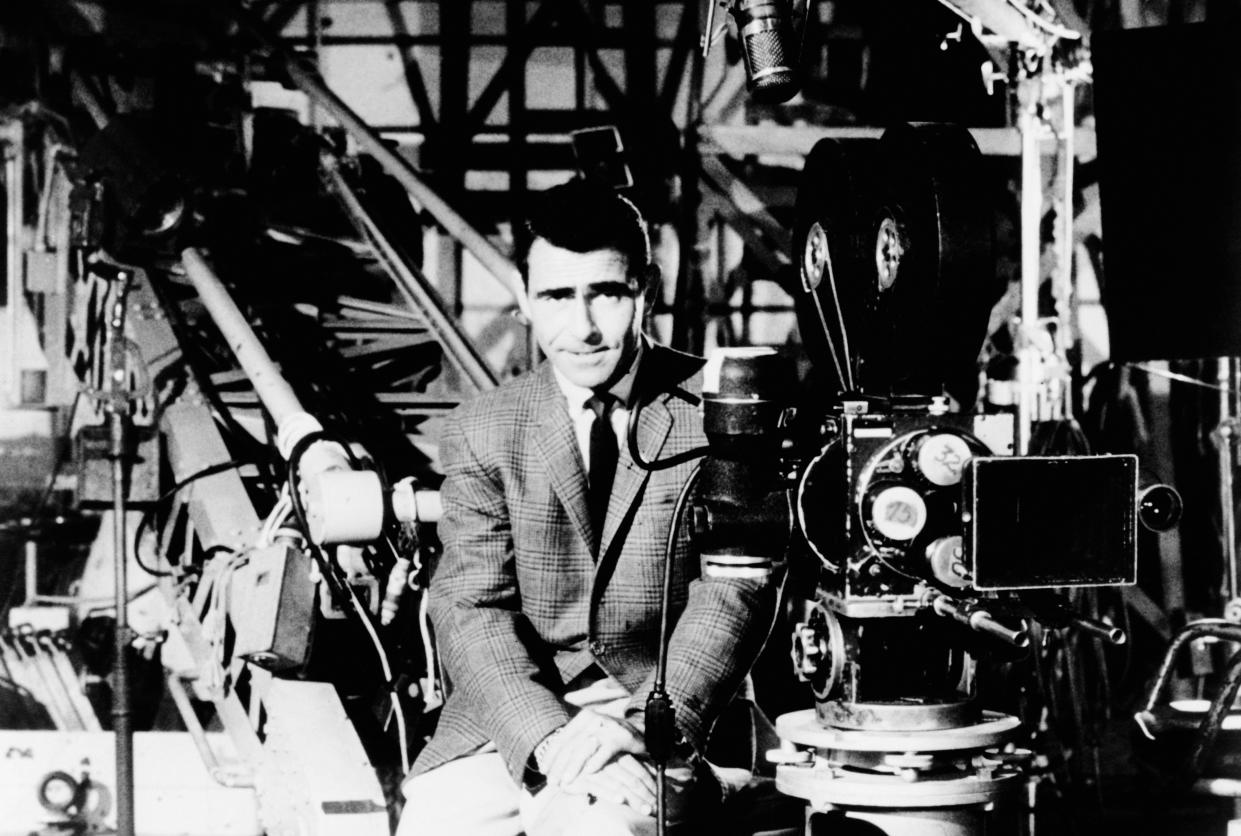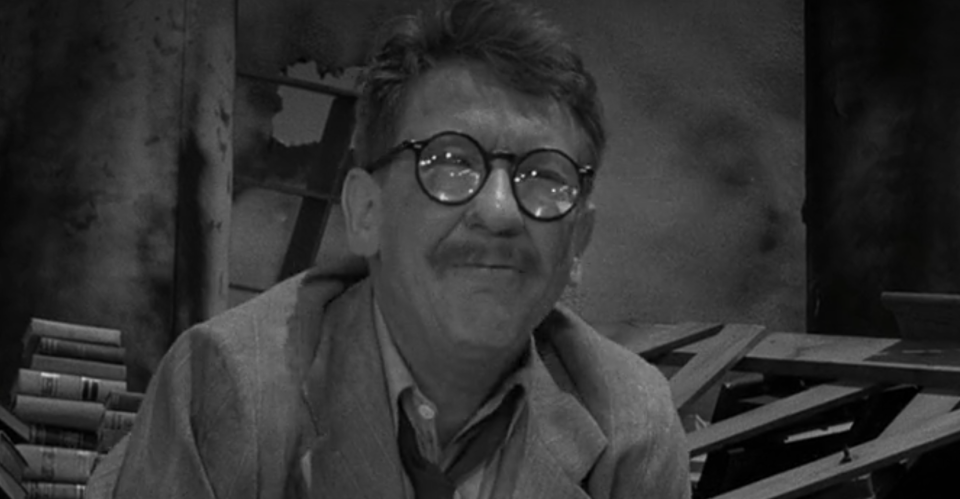Rod Serling's daughter spills 'Twilight Zone' secrets — and the link between MAGA hats and Ariana Grande's Halloween costume

Picture, if you will, America as it existed on the television shows of the 1950s — think titles like Leave It to Beaver, Father Knows Best and The Adventures of Ozzie & Harriet. Those gentle black-and-white portraits of the nation’s small towns and suburbs depicted harmonious communities where the outside world was kept at a distance, and any conflicts could be resolved within a 30-minute span. That vision of America was so tidy, so comforting, it’s no wonder that those shows remain the default way their era is remembered in the collective pop-culture memory — to the point where they are often confused for reality by the politicians, commentators and relatives who speak with feigned nostalgia about some kind of mythic past.
Now picture, if you will, being a child in the 1950s finishing an episode of, say, Leave It to Beaver and then changing channels and entering... The Twilight Zone. Overflowing with big ideas and uniquely attuned to the fault lines running through America, Rod Serling’s pioneering series provided the vital counterpoint to the placid programming that mostly worked to distract viewers from the realities of life. “He started to write The Twilight Zone to address the problems in society,” Serling’s daughter, Jodi Serling, confirms to Yahoo Entertainment. “He felt it was criminal that [television] writers were not permitted to address the social evils that existed.”
At the same time, the realities of his chosen industry meant that he couldn’t be as direct as he might have liked. “Because of the hostile environment that he met with from sponsors, he saw the advantages of writing science fiction and fantasy, which the advertisers would routinely approve only if they took place in a fictional world,” Serling explains. “When reality is something you don't want to deal with, you pretend that it doesn't exist. It's much more plausible for people to accept it when it's not real or personal. My dad just had this incredible ability to transform his ideas and beliefs into beautifully written stories.”

While it may have been an economic decision at the time, Serling’s choice to filter his socio-political commentary through a genre lens is the reason why The Twilight Zone still feels distinctly modern while so many of its competitors exist as museum pieces. The show’s influence on subsequent generations of storytellers can’t be overstated, either. Whether they encountered it in first-run airings and syndicated repeats or DVD boxed sets and streaming services,The Twilight Zone is a gateway into science-fiction, fantasy and horror for so many authors, directors and screenwriters, up to and including Jordan Peele, who is currently overseeing a new version of the series on CBS All-Access that comments on the major social issues of the present day.
Serling himself died in 1975, but his daughter suggest that he’d be on the forefront of the resistance in Trump’s America. “I remember when I was a child, and [Barry] Goldwater was running for president. He said, ‘If Goldwater wins, we’re moving to Canada.’ If he’d been alive when Trump had won, we would be moving to outer space! He would horrified, disgusted, disappointed and appalled by what’s happened with our government, and this man that’s leading the country, to the point where he’d be going around making speeches about Trump.”
We may no longer be able to hear from Serling directly, but he still speaks to us through episodes of The Twilight Zone, which celebrates its 60th anniversary this year. Four seasons of the show are streaming on Netflix, and on Nov. 14, Fathom Events will bring six of the most popular episodes to theaters, accompanied by a new documentary, “Remembering Rod Serling.” We spoke with Jodi Serling for the real-life stories behind some of these classic Twilight Zone tales.
“Walking Distance” (Season 1, Episode 5)

Serling was born in 1924 in Syracuse, N.Y., and came of age in Binghamton. While life took him far from those roots — a tour of duty in the Philippines during World War II, followed by moves to Cincinnati and then California to pursue his writing career — he made a point of taking a solo trip back to his childhood home every summer. Those visits informed this early Twilight Zone episode in which a big city advertising executive (Gig Young) finds his way back to his hometown, where he meets his younger self, as well as his long-dead father. “There are so many pieces of my father in ‘Walking Distance,’” Serling says. “When he was in the war, his father had a heart attack, and he wasn't able to get leave to go see him. By the time he got home, his father had died. Those trips to Binghamton were his way of going back in time. He would sit at the park and just remember the idyllic childhood that was cut short by going into the war.”
Serling enlisted in the U.S. Army in 1943 just after graduating from high school, and arrived in the war’s Pacific theater the following year. According to his daughter, what he witnessed in the Philippines forever changed him, and also shaped him into the storyteller he’d become. “I believe the war broke him,” she says, recounting one particularly horrific incident that stayed with her father for the rest of his life. “He came down with malaria several times in the jungles of the Philippines, and his best friend carried him through the swamps when he was too weak to walk. Towards the end of the war, they were dropping parcels from the sky for the soldiers, and one of the parcels dropped on his friend’s head, and decapitated him right in front of my father’s eyes. I don’t think he ever got over that. My mom said that he’d wake up some nights sweating and thinking he was back in the war. But it also helped him with his writing career: I don’t know if he would have been a writer if he hadn’t gone through all that trauma.”
“Time Enough at Last” (Season 1, Episode 8)

Even as he wrestled with his wartime-inflected trauma, Serling made a point to bring levity and joy into his household. “He had this incredible childlike quality to him,” his daughter remembers. “He’d have these puppets that he'd make come alive, and my sister and I would actually think the puppets were alive. He was a constant joker with his brother. He told me that’s what kept him alive in spirit and mind: never letting go of your childhood quality.” It’s worth noting that there’s plenty of humor to be found in The Twilight Zone as well. Take “Time Enough at Last,” in which a voracious reader (Burgess Meredith) finally gets his wish to have all the time in the world to read thanks to a nuclear apocalypse. But before he can crack open the first tome, his glasses shatter — a wryly funny twist ending that would make O. Henry laugh out loud.
As Serling explains, that ending also highlights one of the central tenets of her father’s philosophy on life. “He drew the line at helping deadbeats and lazy underachievers who thought the world owed them [something],” she says, which dovetails with the way Meredith receives a comeuppance for placing such a high value on his own pleasure that he pushes the rest of the world away. “My father had no tolerance for such human failings as greed, ingratitude, hypocrisy and bigotry, and had an uncompromising integrity when it came to judging people’s commitments to basic values like honesty and sincerity. That's what he always said to me: ‘Be your own self. Don't reap the benefits of someone else's successes.’”
“The Monsters Are Due on Maple Street” (Season 1, Episode 22)

The Twilight Zone premiered on television five years after disgraced Wisconsin Sen. Joseph McCarthy was publicly humiliated during nationally televised hearings, which marked the beginning of the end of his manufactured Red Scare. “The Monsters Are Due on Maple Street” is Serling’s direct commentary on the culture of fear and paranoia that McCarthyism perpetrated on American society. In the episode, an ordinary street in an ordinary town descends into anarchy after the lights flicker off, leading the residents to turn on each other in search of the culprit. Ultimately, it’s revealed that aliens are behind the power failure, as part of their master plan to sit back and watch humanity simply destroy itself.
“It’s about the damage that fear can create in a society,” his daughter confirms. “He was sending a message [to viewers] that chaos can result from fear and prejudice. In so many ways, that’s what’s happening in the world now: people are pointing fingers at others and blaming people. Fear is the culprit right there.”
Although her father was never called to testify in any McCarthy-organized hearing, Jodi Serling says that the Red Scare weighed heavily on his mind. “Sometimes people would say that he was so liberal, he was a Communist, which is crazy” she says. “He was very driven [to defend] the rights of man against prejudice and racism. He just wanted justice and well-being for humanity. He viewed the younger generation as vehicles for changing the way the world was. That’s why he spoke at a lot of colleges, because he felt that they were going to be leading our country.”
“Eye of the Beholder” (Season 2, Episode 6)

Long before David Cronenberg came along, “Eye of the Beholder” gave television viewers a crash course in body horror. This half-hour story follows a young woman (Donna Douglas) as she recovers in a hospital following intensive facial surgery. Because her face is covered for much of the episode, she — and we — can’t see the features of the doctors and nurses who are attending her… that is, until she rips the bandages away and their hideously altered faces come into view. If you’re somehow among the few who don’t already see these creatures in your nightmares, just take a look at Ariana Grande’s Halloween costume, which is directly inspired by this episode.
For her part, Serling argues that there’s more to behold in “Eye of the Beholder” than its freaky pig-faced people. “It’s really about what’s happening today as far as everyone getting plastic surgery in order to look alike and not have any particular identity,” Serling says. “It was like everyone had to be alike all over, which is not what my father wanted. The fact that he would write it when plastic surgery really wasn't out there is pretty significant. ” And the orders for everyone to look alike comes from the top: in the episode, we see footage of this dimension’s leader extolling the virtues of pig-faced uniformity.
Frankly, it’s not unlike the way Donald Trump has turned red “MAGA” hats into a fashion statement for his most devout followers. “Correct — for sure,” Serling agrees when that particular parallel is mentioned. “Sometimes I wonder if my dad would ever have wanted to run for president, because had such strong values about the younger generation, and the world and how to fix it. I’m really honored, because he raised us with these wonderful beliefs that we will carry onto our offspring and hopefully make some changes.”
The Twilight Zone is currently streaming on Netflix. Visit Fathom Events for showtime and ticket information for their 60th Anniversary Celebration.
Read more from Yahoo Entertainment:


